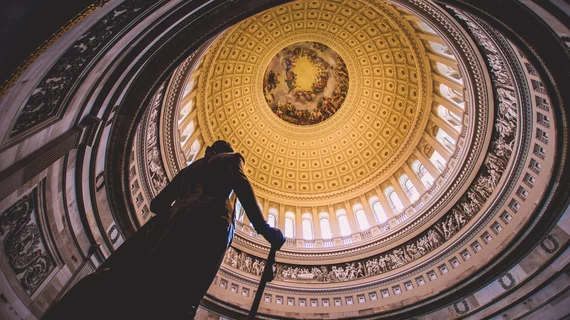ACR, major doc groups urge feds to heed ‘dire’ consequences of surprise billing in California
The American College of Radiology and several other big-name physician groups are urging lawmakers to heed the “dire consequences” of legislation aimed at addressing surprise medical billing in California.
Political leaders have recently cleared the logjam of proposals on Capitol Hill related to this hot-button issue, and are now working to reconcile their differences. In anticipation of these negotiations, ACR and 18 other societies sent a joint letter to leaders Wednesday outlining steps they believe will make the final bill successful.
One major sticking point has been the inclusion of a federal benchmark to settle payment disputes, which providers oppose. In their letter, the groups pointed to the Golden State’s surprise billing remedy enacted a few years ago, which sets out-of-network physician payment rates at the median in-network payment rate.
ACR and others said this provision forced providers to consolidate to stay afloat, with healthcare costs skyrocketing.
“This rate reduction has resulted in dire consequences for patients,” the groups wrote March 4. “For example, anesthesiologists are now leaving the state, which is forcing hospitals to utilize staffing companies and other more costly stopgap arrangements to maintain surgical and specialty on-call coverage. Without anesthesia, it is impossible to perform surgery or deliver babies.”
Instead, physicians are pushing for a handful of provisions they believe “will protect patients and ensure that Congress does not tip the scales in favor of either the physicians or the health plans.” Those include avoiding any references to median in-network rates as a benchmark; ensuring a “robust” and independent means to settle disputes with insurers that excludes a minimum threshold ($750 was one figure tossed out); and requiring the baseball-style arbiter to equally assess various factors in each dispute. The Congressional Budget Office has estimated using a median benchmark rate could result in a pay cut upwards of 20% to physicians, the letter writers noted.
“Like you, we are looking to achieve a balanced approach that does not incentivize insurers to cancel contracts or reduce rates to, at or below the median, since a one-size-fits-all payment benchmark will hamper timely access to care,” wrote the groups, which also include the American Medical Association, College of Surgeons and Society of Anesthesiologists, among others.
The House Energy and Commerce, Education and Labor, and Ways and Means committees have all offered up their own proposals to address surprise billing, with the ACR calling the latter’s “commonsense.”
In a corresponding news post, the college said it expects negotiations to last several weeks, with House Speaker Nancy Pelosi indicating she’d like to finish work by early spring.

